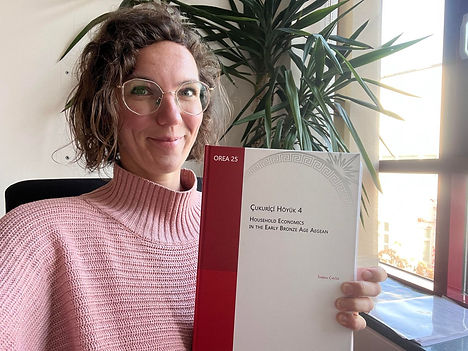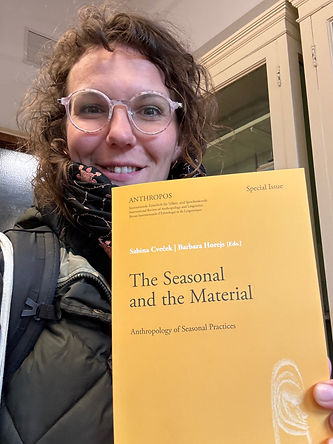Books
2022. Çukuriçi Höyük 4: Household economics in the Early Bronze Age Aegean. Austrian Academy of Sciences Press.

Description
“Çukuriçi Höyük 4. Household Economics in the Early Bronze Age Aegean" is a pioneering interdisciplinary account of households and socio-political organization in Aegean prehistory, written by a socio-cultural anthropologist embedded in a team of prehistoric archaeologists.
Sabina Cveček applies methods of historical anthropology to address key issues in discussing households and socio-political organization at the dawn of the Bronze Age Aegean and beyond. By navigating through the “dwelling perspective” of the people at two prehistoric mound sites, namely Çukuriçi Höyük in western Anatolia (Turkey) and Platia Magoula Zarkou in Thessaly (Greece), Cveček scrutinizes the conflicting relations between metanarratives and site-based archaeological contexts, complemented by historical ethnographic accounts.
This unique interdisciplinary contribution will appeal not only to specialists in Aegean prehistory and historical anthropologists but also to scholars in the social sciences and humanities. It may inspire students to recognize the unparalleled value of archaeological materiality in addressing non-state imaginary communities, alongside historical, ethnographic, and other written sources.
Reviews
"A highly original collaboration with archaeologists … If social anthropology is to continue its foundational interest in full sociocultural diversity, it must now engage with historical sources that, as Cveček shows, can and should include archaeology … this book manuscript could be transformational for her discipline."
—Timothy Earle, Professor Emeritus, Northwestern University (Evanston, IL)
"By applying historical anthropology and sociocultural-anthropological models of “big-man” vs. “great-man” societies, the author seeks a more sophisticated understanding of sociocultural processes in the archaeological record than hitherto allowed by more limited archaeological applications of models of social organization. The work admirably fulfills this aim."
—Peter Whiteley, Curator of North American Ethnology, American Museum of Natural History (New York, NY)
"In sum, there are several great strengths to Cveček’s book. First is the careful examination of models of prestate and small-scale social (and economic) organization through the social anthropological literature, and its presentation without bias. Of note is the reconfiguration of the concept of “tribe” and the demonstration of its usefulness as an overarching, general category encompassing multiple forms of social organization characteristic of those pre-state, small-scale societies, and the arguments against the over-used, static concept of chief and chiefdom. Second is her detailed application of these models to the archaeological data at the two sites to suggest possibilities. Third is her comparative approach where she looks at each site within its larger regional context and against each other. And fourth is her recognition of variability in social organization in these late Chalcolithic/Final Neolithic to earliest Bronze Age societies, even within regions that share many cultural traits. This book will be of great utility to those interested in pre-state societies and their socio-economic organization, no matter whether they work in Aegean prehistory or elsewhere."
—Daniel J. Pullen, Professor Emeritus, Florida State University (Tallahassee, FL) in the Journal of Near Eastern Studies
.jpg)
2024. The Seasonal and the Material: Anthropology of Seasonal Practices. Anthropos.
Special issue co-edited with Barbara Horejs.

Description
The Seasonal and the Material aims at three things. To test what new knowledge can be generated when we bring together scholars working in different regions and specialists in different periods through an overarching lens. To see what happens when scholars apply seasonality as this overarching lens to their ethnographic and archaeological material. And finally, to question perspectives on how we can best view human and non-human beings through the lens of temporality and seasonality. The contributions from different subfields of anthropology were originally presented at a session at VANDA: Vienna Anthropology Days 2022, organized by the editors in Vienna.
With contributions by
Augusto S. Cacopardo | Raffaella Da Vela | Hojjat Darabi | Laura Dietrich | Oliver Dietrich | Wulf Frauen | Andre Gingrich | Çlirimtare Januzaj | Franz Krause | Lisa Francesca Rail | Peter Rohrbacher | Peter Schweitzer
